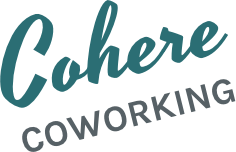When compared to the typical corporate office job, there aren’t too many downsides to being freelancer or business owner. You decide who you will work for and with, where you’ll work, and best of all, what kind of work you’ll do. For the self-employed, work is almost always a personal passion, which brings both challenges and satisfaction to an entirely new level.
But it’s not all a bed of roses. As Heidi Kerr-Schlaefer (former member of Cohere and current member of the Armory Workspace in Loveland) recently wrote on her company blog, there are “no sick days for the self-employed.” When the flu attacks the typical office worker, all they have to do is cash in a few paid sick days, and they can wallow in tissues and tea without worrying about how to pay the bills. When a freelancer gets sick, there are only two choices: work through the pain, or lose the money.
Well, we think that’s crap. The self-employed work just as hard, no, harder than the average cubicle dweller. Why should we suffer, financially and physically, just because there’s no HR department to dole out PTO? We deserve a day off now and then. We looked into it, and there is a way for freelancers to earn paid sick days. It takes some pre-planning and long-term goal-setting, as well as the ability to set a work schedule and stick to it, but the payoff is guilt-free rest and relaxation.
Four Simple steps to earning paid sick days via Andrea Ruiz/Yahoo!
1. Decide how much money you need to earn. This amount should be factored yearly. Use last year’s earnings as a guide.
2. Divide this amount by how many weeks out of the year that you want to work. Don’t get sick that often? Set aside a week. Got kids that love to bring home nasty viruses and spread them around the family? Two weeks. So, if you’re the family example, that would mean your goal annual earnings divided by 50 weeks of work.
3. Deduct any weekly unearned income you receive from this amount, such as child support, alimony or disability insurance, that you are counting toward your annual income goals.
4. Divide this amount by how many days per week you want to work. This is the amount of money you need to make every day in order to earn your target annual income and still afford yourself paid time off.
If you’re flexible about how much you want to earn, or don’t mind working six days a week, simply work this into the formula. And hey, there’s even a way to accrue vacation days as well! And if you’re having trouble with the sticking to a schedule part of this equation, that’s what we’re here for! Coworking instead of fighting off distractions at home or in a coffee shop will ensure that you meet your earning goals so when there’s a sickness or an urge to take off to Mexico, you’ve got the days set aside.
Image via mikecharliealpha/Flickr

